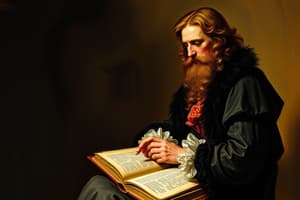Podcast
Questions and Answers
What are two key characteristics of metaphysical poetry?
What are two key characteristics of metaphysical poetry?
Metaphysical poetry is characterized by intellectual depth and intricate metaphors.
How do metaphysical poets approach themes of love?
How do metaphysical poets approach themes of love?
Metaphysical poets treat love as both physical and spiritual, linking earthly existence with divine truth.
Give an example of a metaphysical poet and describe their style.
Give an example of a metaphysical poet and describe their style.
John Donne is an example, known for blending wit with religious devotion and passionate argumentation.
What is the significance of conceits in metaphysical poetry?
What is the significance of conceits in metaphysical poetry?
How do metaphysical poets use reasoning and argumentation in their poems?
How do metaphysical poets use reasoning and argumentation in their poems?
What is a conceit in metaphysical poetry and provide an example?
What is a conceit in metaphysical poetry and provide an example?
Describe the nature of themes typically explored in metaphysical poetry.
Describe the nature of themes typically explored in metaphysical poetry.
How do metaphysical poets utilize paradoxes in their work?
How do metaphysical poets utilize paradoxes in their work?
What role does wit play in metaphysical poetry?
What role does wit play in metaphysical poetry?
Explain the significance of irregular meter and rhythm in metaphysical poetry.
Explain the significance of irregular meter and rhythm in metaphysical poetry.
What is meant by the fusion of emotion and intellect in metaphysical poetry?
What is meant by the fusion of emotion and intellect in metaphysical poetry?
How do allusions to contemporary sciences and philosophies function in metaphysical poetry?
How do allusions to contemporary sciences and philosophies function in metaphysical poetry?
What distinguishes the tone of metaphysical poetry from other poetic styles?
What distinguishes the tone of metaphysical poetry from other poetic styles?
Flashcards
Metaphysical Poetry
Metaphysical Poetry
Poetry characterized by intellectual depth, intricate metaphors, and philosophical exploration.
Exploration of Existence
Exploration of Existence
Metaphysical poets delve into questions about life, death, and the universe, often using religious or philosophical imagery.
Abstract Reasoning
Abstract Reasoning
Metaphysical poems rely more on intellectual argumentation than emotional expression.
Conceits
Conceits
Signup and view all the flashcards
Spiritual and Physical Love
Spiritual and Physical Love
Signup and view all the flashcards
Reasoning and Argumentation
Reasoning and Argumentation
Signup and view all the flashcards
John Donne
John Donne
Signup and view all the flashcards
George Herbert
George Herbert
Signup and view all the flashcards
Andrew Marvell
Andrew Marvell
Signup and view all the flashcards
Metaphysical Poetry Conceits
Metaphysical Poetry Conceits
Signup and view all the flashcards
Metaphysical Themes
Metaphysical Themes
Signup and view all the flashcards
Metaphysical Structure
Metaphysical Structure
Signup and view all the flashcards
Metaphysical Paradoxes
Metaphysical Paradoxes
Signup and view all the flashcards
Metaphysical Wit
Metaphysical Wit
Signup and view all the flashcards
Metaphysical Tone
Metaphysical Tone
Signup and view all the flashcards
Metaphysical Meter/Rhythm
Metaphysical Meter/Rhythm
Signup and view all the flashcards
Metaphysical Allusions
Metaphysical Allusions
Signup and view all the flashcards
Metaphysical Emotion/Intellect
Metaphysical Emotion/Intellect
Signup and view all the flashcards
Metaphysical Poetry Brevity
Metaphysical Poetry Brevity
Signup and view all the flashcards
Study Notes
Metaphysical Poetry: Key Characteristics
- Conceits: Extended, surprising metaphors comparing unrelated ideas. Example: comparing lovers' connection to a compass (Donne's "A Valediction: Forbidding Mourning").
- Complex Themes: Focus on philosophical, spiritual, and intellectual topics like love, death, faith, and existence. Explored through reason and logic, not emotion.
- Intellectual Structure: Poems often structured as arguments or debates, using persuasive logic to explore ideas.
- Paradoxes and Contradictions: Use of paradoxes to challenge thinking and convey complex truths. Example: Death both powerful and powerless ("Death Be Not Proud," Donne).
- Wit and Wordplay: Intellectual humor and clever language are crucial, used to challenge readers intellectually.
- Dramatic/Conversational Tone: Mimics conversation, debate; often addresses the reader directly. Example: playful argument in Donne's "The Flea."
- Irregular Meter and Rhythm: Breaks from smooth rhythm; mirrors thoughts, conversation.
- Allusions: Incorporated references to science, philosophy, and religion, using them as metaphors (e.g., heliocentric universe, alchemy).
- Emotion and Intellect: Combines intense feelings with deep intellectual thought.
- Brevity and Compression: Packed profound ideas into short, powerful lines.
Metaphysical Poetry: Themes and Exploration
- Existence and Knowledge: Explore life, death, afterlife; often use religious/philosophical imagery, exploring human limitations. Example: nature of death ("Death Be Not Proud").
- Abstract and Intellectual: Relies on logic and reasoning, challenging conventional thinking, blending theology, science, philosophy.
- Conceits (Extended Metaphors): Use surprising comparisons to connect seemingly unrelated things. Example: Lovers as a compass.
- Spirituality and Love: View love as both physical and spiritual, linking earthly and divine. Example: Herbert's "The Collar."
- Reasoning and Argumentation: Structured as arguments, using logical reasoning; reflects intellectual tone, as in Marvell's "To His Coy Mistress."
Notable Metaphysical Poets
- John Donne: Key figure, combining wit, religious devotion, and passionate arguments.
- George Herbert: Known for deeply personal, spiritual poetry.
Studying That Suits You
Use AI to generate personalized quizzes and flashcards to suit your learning preferences.




